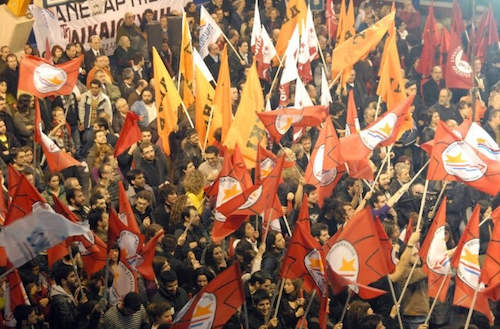Palestine: Hugo Chavez condemns Israel's “savage” assault on Gaza Strip

Hugo Chavez criticised Israel's assault on the Gaza Strip as “savage” (Telesur).
By Ewan Robertson
November 16, 2012 -- Venezuelanalysis.com – Venezuela's President Hugo Chavez has condemned Israel’s latest assault on the Gaza Strip as “savage”, and called for an end to “aggression” against the Palestinian people. “Another aggression against the Gaza Strip has begun. Savage, savage: the state of Israel bombing the Gaza Strip again”, said Chavez to ministers yesterday in reference to Israel’s ”Pillar of Cloud” airstrike campaign against the Palestinian territory.
Israel began its offensive on November 14 by killing the military chief of the Palestinian organisation Hamas. Agencies report that 28 Palestinians and three Israelis have died in the conflict so far, with a further 250 Palestinians wounded.
The Venezuelan president argued that Israel's operation is occurring “because the [Palestinian] president Mahmoud Abbas has insisted that he’s going to request, once again, the entrance of Palestine as a full member state of the United Nations”.

By Paul Kellogg
Stop Israel's new massacre in Gaza: Boycott Israel now! -- Palestinian BDS National Committee

November 15, 2012 -- On November 8, Israel carried out an attack on civilians in the occupied and besieged Gaza Strip, shooting 13-year-old Ahmad Abu Daqqa while he played football with friends. By November 14, Israel had intensified its attacks on Gaza and begun to implement an intensive plan of aggression that at the time of writing has killed at least 15 Palestinians, including at least six children, and injured over 150, predominantly civilians.
Despite biased Western media reports to the contrary, it is clear that Israel has initiated and escalated this new assault [1] on the eve of its upcoming parliamentary elections, underlining the time-honoured Israeli formula of Palestinian bodies for ballots.[2]
It is worth noting that a great majority of the Gaza population are refugees ethnically cleansed by Zionist militias and later the state of Israel during the 1948 Nakba and denied by Israel their UN-sanctioned right to return to their homes of origin.
Rafael Correa discusses Ecuador's 'Citizens' Revolution' and answers his left critics

Rafael Correa speaks at a rally in support of his re-election in next year's poll, Quito, November 10.
By Federico Fuentes
November 11, 2012 -- Green Left Weekly -- While European governments continue to impose policies aimed at making working people pay for a crisis they did not cause, the Ecuadorian government of Rafael Correa has taken a different course.
“Those who are earning too much will be giving more to the poorest of this country”, a November 1 Reuters dispatch quoted Correa as saying. He was announcing a new measure to raise taxes on banks to help fund social security payments.
Ecuador’s banking sector has registered US$349 million in after-tax profits, a November 8 El Telegrafo article said. “The time has arrived to redistribute those profits,” said Correa.
Reuters reported that by lifting the tax rate on bank holdings abroad and applying a new tax on financial services, the government hopes to raise between $200 million and $300 million a year.
The proceeds will fund a rise in the “human development bonus payment” from $35 to $50 a month. About 1.2 million Ecuadorians receive the payment, mainly single mothers and the elderly.

A protest in Parramatta, a suburb of Sydney, on November 15, 2012, called for an end to Israel's attacks on Gaza.
The Noynoy government must condemn Israel’s actions and support build-up of international pressure to stop Israeli aggression!
Statement byPartido Lakas ng Masa (PLM, Party of the Labouring Masses, Philippines)
Sri Lanka to be 'tried' for genocide against Tamils
By Ron Ridenour
November 11, 2012 -- Links International Journal of Socialist Renewal -- An unprecedented move by internationalists and activists for human rights and justice, one that could inspire controversy among left-oriented governments and peoples´ solidarity committees, will take place next spring.
In April 2013, a panel of international experts will be convened as"Judges of the Permanent People's Tribunal to examine reports submitted by many specialised working groups on the accusation of the crime of genocide against the government of Sri Lanka and on the accusations against various international actors who had supported and prepared the conditions for the Sri Lankan government to implement this alleged crime”, stated the Rome-based Permanent People's Tribunal (PPT) on November 3, 2012.[1]
This decision is supported organisationally by the Irish Forum for Peace in Sri Lanka (IFPSL), based in Dublin, and the International Human Rights Association (IMRV), based in Bremen.
In mid-January 2010 the Permanent Peoples’ Tribunal on Sri Lankan held its sessions in Dublin. There were four findings:
1: That the Sri Lankan government and its military are guilty of war crimes;
2: That the Sri Lankan government and its military are guilty of crimes against humanity;
November 14, 2012 -- Al Jazeera's Shakuntala Santhrian interviews Ali Abunimah, co-founder of Electronic Intifada. More from Ali Abunimah below the interview with Shamikh Badra.
* * *
Green Left Weekly's Peter Boyle & Patrick Harrison interview Shamikh Badra, Gaza-based activist with the Palestine People's Party
November 15, 2012 -- Green Left Weekly -- Israel has launched a fresh full-scale war on the besieged people of Gaza. As well as assassinating a Hamas spokesperson (and publicly threatening all Hamas representatives), more than 10 people had been killed by November 15. The dead reportedly includes Omar, an 11-month-old baby whose father works for BBC Arabic.
Germany: Red Pepper interviews new Die Linke co-leader Katja Kipping

Emma Dowling speaks to Katja Kipping, new co-chair of Germany's Left Party (Die Linke)
November 2012 -- Red Pepper -- With 76 seats out of 622 in parliament, Die Linke is Germany’s fourth-largest party. It was founded in 2007 in a merger between the Party of Democratic Socialism (PDS) and the Electoral Alternative for Labour and Social Justice (WASG). Members of the PDS were predominantly East German and many had also been members of the Socialist Unity Party, the former ruling party of East Germany. WASG, meanwhile, was predominantly West German and made up of trade unionists and social movement activists, as well as social democrats who had left the German Social Democratic Party.
Indonesia: New governor of Jakarta raises hopes of the poor

Thousands celebrate the October 15, 2012, inauguration of Jakarta governor Joko Widodo (better known as Jokowi). Photo: Berdikari Online.
Hurricane Sandy is another blow to Haiti

Farmers in Haiti. Photo by Elizabeth Whelan.
By Roger Annis
November 10, 2012 -- Rabble, posted at Links International Journal of Socialist Renewal with Roger Annis's permission -- Hurricane Sandy struck another heavy blow to Haiti on October 23, 24, 2012. At least 54 people died and dozens more are missing. Several tens of thousands of people were flooded out of their homes or earthquake survivor camps.
There are some 370,000 people stuck in appalling conditions in the camps while hundreds of thousands more have gone back to damaged homes or whatever other inadequate shelter they can find.
Most media reports focused almost entirely on the storm's impact on the United States, while mostly ignoring its severe consequences in the Caribbean.
Media reports, and doesn’t report, on Sandy in Haiti
Land grabbing: A new colonialism

A nascent oil palm plantation in southeastern Sierra Leone owed by Socfin Agriculture Company, which in March 2011 signed a 50-year lease with the government of Serra Leone. Photo by Felicity Thompson/IRIN.
By Alan Broughton
November 6, 2012 – Links International Journal of Socialist Renewal -- Since the global financial crisis of 2008 and its associated food crisis that sent another 200 million people into malnutrition, there has been a massive grab for land by large corporations around the world. Worst hit has been Africa, where food security is already non-existent for many people. Governments, including the Australian government, welcome this “investment” in agriculture, some bizarrely claiming that food security will be increased.